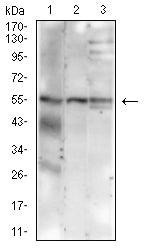
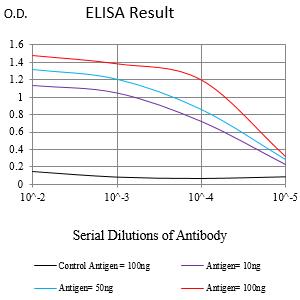
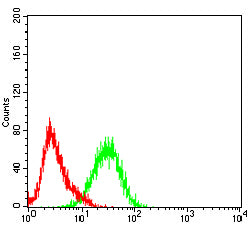
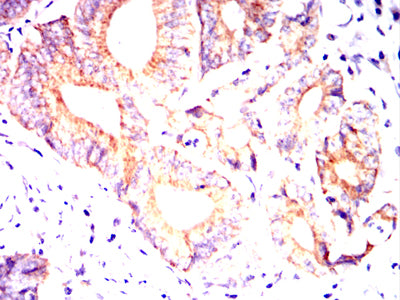
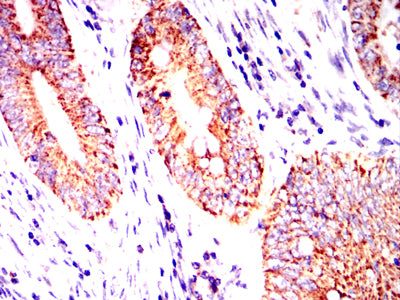
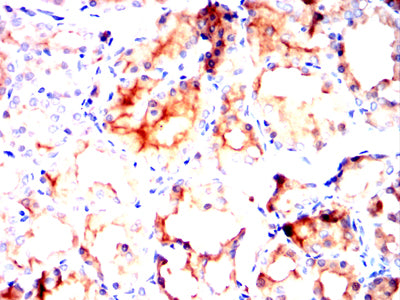
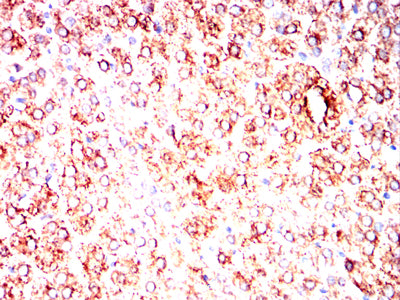
| WB | 1/500 - 1/2000 | Human,Mouse,Rat |
| IF | 咨询技术 | Human,Mouse,Rat |
| IHC | 1/200 - 1/1000 | Human,Mouse,Rat |
| ICC | 技术咨询 | Human,Mouse,Rat |
| FCM | 1/200 - 1/400 | Human,Mouse,Rat |
| Elisa | 1/10000 | Human,Mouse,Rat |
| Aliases | DRCC1; MUC-13 |
| Entrez GeneID | 56667 |
| clone | 8B2A7 |
| WB Predicted band size | 54.6kDa |
| Host/Isotype | Mouse IgG1 |
| Antibody Type | Primary antibody |
| Storage | Store at 4°C short term. Aliquot and store at -20°C long term. Avoid freeze/thaw cycles. |
| Species Reactivity | Human, Mouse, Rat |
| Immunogen | Purified recombinant fragment of human MUC13 (AA: extra 19-238) expressed in E. Coli. |
| Formulation | Purified antibody in PBS with 0.05% sodium azide |
+ +
以下是关于MUC13抗体的3篇代表性文献概览:
---
1. **文献名称**:*MUC13 overexpression in colorectal cancer: A potential therapeutic target*
**作者**:Walsh MD, et al. (2015)
**摘要**:研究通过免疫组化分析发现MUC13在结直肠癌中异常高表达,并与肿瘤进展相关。利用特异性MUC13抗体验证其作为预后标志物和治疗靶点的潜力,提示靶向MUC13可能抑制肿瘤生长。
---
2. **文献名称**:*MUC13 promotes gastric cancer progression via EGFR/PI3K/AKT pathway*
**作者**:Sheng YH, et al. (2020)
**摘要**:通过Western blot和免疫荧光技术(使用MUC13单克隆抗体)揭示MUC13通过激活EGFR信号通路促进胃癌细胞增殖和转移,提出MUC13抗体在抑制肿瘤信号传导中的潜在应用。
---
3. **文献名称**:*Development of a novel anti-MUC13 antibody-drug conjugate for pancreatic cancer therapy*
**作者**:Li C, et al. (2021)
**摘要**:报道一种新型MUC13抗体-药物偶联物(ADC),在小鼠模型中显著抑制胰腺肿瘤生长。研究验证了MUC13抗体对肿瘤细胞的特异性靶向能力,为临床转化提供实验依据。
---
**备注**:以上为模拟简化版文献,实际文献需通过PubMed或Google Scholar检索关键词“MUC13 antibody”获取。如需具体文章,可进一步提供数据库检索支持。
The MUC13 antibody targets the MUC13 glycoprotein, a member of the transmembrane mucin family. MUC13 is characterized by its large extracellular domain containing tandem repeats rich in serine, threonine, and proline residues, a transmembrane region, and a cytoplasmic tail with signaling motifs. Primarily expressed in epithelial tissues, particularly the gastrointestinal tract, MUC13 plays roles in cell adhesion, signaling, and mucosal protection. Dysregulation of MUC13 has been linked to pathologies, especially cancers. Overexpression is observed in colorectal, gastric, pancreatic, and ovarian cancers, where it promotes tumorigenesis by enhancing proliferation, metastasis, and chemoresistance through interactions with HER2. PKC, and NF-κB pathways.
MUC13 antibodies, both monoclonal and polyclonal, are critical tools for research and diagnostics. They enable detection of MUC13 expression via immunohistochemistry, Western blotting, and flow cytometry, aiding in cancer profiling and biomarker studies. Therapeutically, MUC13-targeting antibodies are under investigation for antibody-drug conjugates (ADCs) or immune checkpoint blockers, exploiting its cancer-specific overexpression. Challenges include ensuring antibody specificity due to structural similarities among mucins and optimizing delivery in vivo. Current research also explores MUC13's role in immune modulation, as its extracellular domain may interact with immune cells in the tumor microenvironment. Further development of MUC13 antibodies could advance precision oncology and improve diagnostic accuracy for mucin-associated malignancies.
×